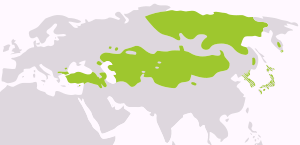Altaic languages facts for kids
Quick facts for kids Altaic |
|
|---|---|
| (discredited) | |
| Geographic distribution: |
East, North, Central, and West Asia and Eastern Europe |
| Linguistic classification: | Proposed major language family |
| Subdivisions: |
Koreanic (sometimes included)
Japonic (sometimes included)
Ainu (sometimes included)
|
| ISO 639-2 and 639-5: | tut |
 Distribution of the Altaic languages across Eurasia.
|
|
The Altaic language family is a group of languages that some linguists once thought were related. It's like a big family tree for languages. However, today, most experts do not believe this family truly exists.
This idea suggested that about 66 languages were part of the Altaic group. Around 348 million people speak these languages. They are mostly found in and around Central Asia and northeast Asia.
What are Altaic Languages?
The main idea of Altaic included three major language groups:
- Turkic languages: Spoken in places like Turkey and Central Asia.
- Mongolic languages: Spoken in Mongolia and nearby areas.
- Tungusic languages: Spoken in parts of Siberia and Northeast Asia.
This core group is sometimes called "Micro-Altaic."
Expanding the Altaic Idea
Over time, some linguists thought other languages might also belong to the Altaic family.
- In the 1950s, some experts started including Korean.
- Later, in the 1970s, some also added Japanese and Ryukyuan. These two together form the Japonic group.
When Korean and Japanese are included, this bigger group is sometimes called "Macro-Altaic." A few linguists even suggested that the Ainu language (spoken in Japan) might be part of this larger family.
However, even the core idea of Altaic (Turkic, Mongolic, Tungusic) is very much debated. Most linguists today do not support the idea of an Altaic language family.
Images for kids
-
The Altai Mountains in East-Central Asia give their name to the proposed language family.
See also
 In Spanish: Lenguas altaicas para niños
In Spanish: Lenguas altaicas para niños
 | Kyle Baker |
 | Joseph Yoakum |
 | Laura Wheeler Waring |
 | Henry Ossawa Tanner |


